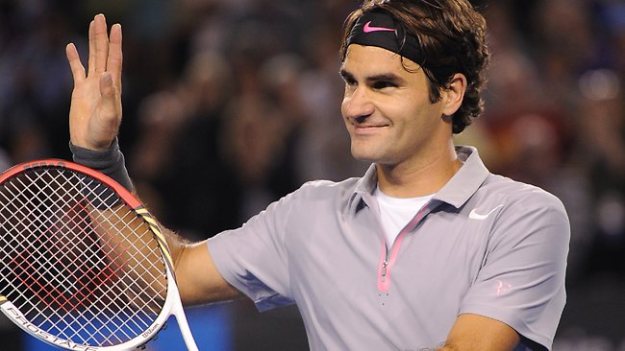On the eve of his umpteenth late-round matchup with Rafael Nadal, does the 17-time Grand Slam Champion have enough in the tank to win another major?
By Jake Sweltz

It’s easy to call Roger Federer ageless. His picture-perfect mechanics, his textbook footwork, his exquisite touch, all of it has remained stunningly identical to the technique he demonstrated in 2003 (the year he first won Wimbledon, beginning a run of dominance unparalleled in the history of professional tennis). But there’s something about Federer’s aesthetic continuity that goes beyond his game. Even his face, with its features both sharp yet soft, is a constantly familiar canvas of boyish handsomeness. The man seems perpetually frozen in time, as though he were some kind of athletically appareled immortal. A bandanna’d Dorian Gray, all decked out in Nike sweat gear. Peter Pan in stretch polyester.
But Federer doesn’t live in Neverland, and that’s become increasingly obvious over the past few seasons. He hasn’t reached a Slam final since winning Wimbledon in July 2012, the same year he last held the ATP’s no. 1 ranking. Last summer, after suffering his worst major defeat in nearly a decade (losing in Wimbledon’s 2nd round to Sergiy Stakhovsky, ranked no. 116 at the time), a question once unthinkable suddenly became all too reasonable: “Is this the end of Roger Federer?”
Of course, in the realm of international tennis, “the end” is a tremendously relative term. Federer finished 2013 as the world no. 6, a ranking countless players would die to achieve even once in their entire career. But for a player like Federer, a player the sport has largely embraced as no less than the Greatest of All Time, falling to no. 6 is roughly equivalent to Zeus falling off Mount Olympus.
Roger Federer might be immortal, but he’s not eternal. And now, with yet another shot at yet another title on the line, he’s finally playing like he knows it.
– – –
This Friday will mark Federer’s eleventh consecutive Australian Open semifinals appearance, his longest remaining streak of sustained success among the four major tournaments. Still, it feels like ages since he’s been a real factor in Melbourne, partially because this is where Novak Djokovic has so frequently dominated the narrative (he’s won the last three). But more than that, the past three Aussie Open semifinals have proven symbolically tragic for Federer. A year after winning the title in 2010, he was beaten in straight sets by the ascendent Djokovic. The following year, he was defeated by Rafael Nadal in four sets. A year later, he lost a five-setter to Andy Murray. By now, the Rivalry had been firmly displaced by the “Big Four,” and each encroaching player could claim a signature win over Federer in Rod Laver Arena.
It was within this ominous context that Federer faced off against Andy Murray in the quarterfinals Wednesday morning. Three years ago, this matchup would barely have warranted a passing glance. Now, it’s a different story. These days, a significant Federer victory is far from assured, and maybe even unlikely. Murray was not to be taken lightly.
And yet, for the first two sets, you could have sworn it really was three years ago. The first set lasted all of thirty minutes, with Federer capturing an early break and breezing through his own service games with little effort. Murray, on the other hand, had reverted to the kind of clumsiness and frustration that made him a punchline among pundits not long ago. He looked helpless trying to deal with Federer’s efficient serve-and-volley approach, and his body language was telling the story every bit as well as the score.
By the middle of the second set, Federer had made a cozy home at the net, but Murray was finally starting to come around. Federer’s age betrays him when it comes to arduous baseline-to-baseline rallies, and after going down a break, Murray began initiating those more and more. By the time Federer closed out the set, it was clear Murray had found a groove.
Despite ultimately winning the match, seeing Federer fade a bit down the stretch against a more assertive Murray leaves me wondering if he will ever again possess the pure physicality to hang with Nadal. When the Spaniard starts launching those late-set baseline body blows, will Federer still have enough in the tank to respond?
He seems to think so. “I am back physically,” he commented after the match. “I’m explosive out there. I can get to balls. I’m not afraid to go for balls.” But who is he really trying to convince?
It’s true that Federer looked strong and agile throughout much of the match, but what stood out even more than his movements during the run of play were his reactions after the points had ended. Since his maturation around 2004, Federer hasn’t often let his emotions rise to the surface during matches, but I’ll be damned if he didn’t look like he actually cared about the outcome on Wednesday. He was fist-pumping after half-volleys, drooping his head after backhands sent just wide, shouting in triumph after forehand winners. You could read the tension on his face with every big opportunity, and that was something that we simply hadn’t seen from Federer during his run of dominance.
This Friday, he and Nadal will be going head-to-head yet again in a major late-round showdown, and for that we should all be grateful. Part of what makes athletic greatness so inspiring to witness is our knowledge that it can’t last forever. Transcendence is transient. Time marches on, our idols grow old, retire and sell underwear. But none of that matters when the ball is in play. How can mortality possibly be real as we watch these heroic specimens perform feats beyond all physical comprehension and believe, for a moment in time, that we live among gods?